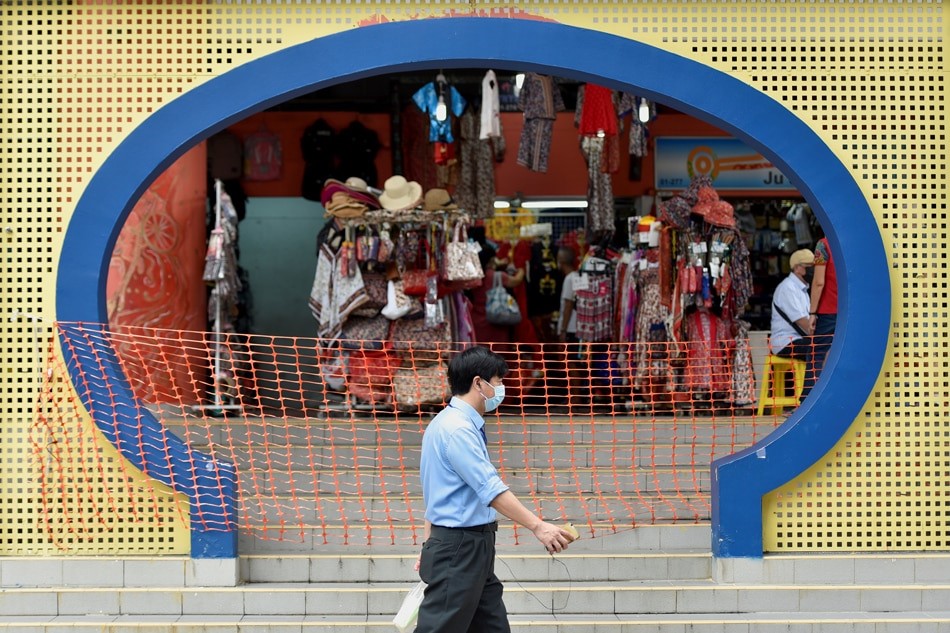Warren De Guzman, ABS-CBN News
Posted at Nov 12 2021 05:08 PM

MANILA— The Philippine central bank is looking to make it easier for Filipinos to transact with businesses and individuals across the ASEAN region through a region-wide payment network, it said Friday.
The Bangko Sentral ng Pilipinas earlier signed a deal with the Monetary Authority of Singapore to start discussions on how to regulate and facilitate cross-border payments between Singaporeans and Filipinos.
The BSP noted Singapore is a key trading partner and major source of remittances and that pursuing seamless e-payments is seen to benefit overseas Filipinos and local export, import and tourism businesses.
In a forum, BSP Director Raymond Estioko said there is nothing formal yet but the discussions should lead to a concrete agreement on how the two countries can facilitate, as well as regulate, cross border payment solutions so that individuals in either country can take advantage of digital payment solutions with minimum cost and maximum convenience.
Estioko said a lot of work still needs to be done with Singapore, but the BSP is also already in talks with other ASEAN nations to push for the creation of an ASEAN Payment Network.
“There is constant communication with our ASEAN neighbors to enter with cross border agreements with them. Singapore was just the first because of our strong economic relationship with them. We have bilateral and multilateral experience with them which we can learn from," Estioko said.
The BSP has already identified which country will be next in terms of bilateral agreements.
Gauging from the economic activity, "it is either Malaysia or Thailand," the official said.
While cross-border payment such as the cooperation with Singapore may seem straightforward to consumers, especially those who already transact with international vendors and individuals through online banking and e-commerce platforms, there is a lot to be considered when it comes to regulation, the BSP said.
The BSP and the MAS have to iron out how to handle disputes when transactions go wrong.
Data privacy, identity verification, payment settlements, foreign exchange and other digital banking services should also be discussed, the central bank said.
Philippines, Singapore launch program to boost digitalization of 5,000 small businesses
The Department of Trade and Industry and the Monetary Authority of Singapore (MAS) on Thursday launched a program that aims to digitalize at least 5,000 Filipino small businesses.
The "Business Without Borders" program will enable micro, small and medium enterprises to bring their businesses online and widen their customer base outside the country, Trade Secretary Ramon Lopez said during the virtual launch.
The program is part of the Philippine Trade Training Center's (PTTC) meeting with the MAS conducted before the COVID-19 pandemic.
Success through online channels is possible due to the country's high mobile penetration and record social media use with at least 80 million active users, Lopez said.
"This program is intended to enable at least 5,000 Pinoy SMEs and e-Retailers this year to trade beyond our borders and equip them with the necessary skills needed," Lopez said.
Online business registrations skyrocketed with over 109,345 business name registrations for online businesses since March 2020, Lopez said.
"All these numbers present a very strong potential to be converted into e-commerce transactions," he explained.
In a commissioned study by Google, data showed that helping businesses boost their digital transformation could generate up to P5 trillion annually by 2030.
E-commerce can also drive the country's internet economy to $28 billion by 2025, the tech giant earlier said.
Lopez said the agency also offers various programs such as the COVID 19 Assistance to Restart Enterprises or CARES program of microfinancing arm, the Small Business Corporation (SB Corp), which could propel Filipino businesses to success.
Philippines, Singapore sign deal for seamless cross-border payments: BSP
 A man walks past a cordoned-off entrance, amidst the coronavirus disease (COVID-19) pandemic, in Singapore November 3, 2021. Caroline Chia, Reuters/File
A man walks past a cordoned-off entrance, amidst the coronavirus disease (COVID-19) pandemic, in Singapore November 3, 2021. Caroline Chia, Reuters/File
The Bangko Sentral ng Pilipinas on Thursday said it signed a deal for seamless cross-border payments between the Philippines and Singapore.
Ravi Menon, Managing Director of the Monetary Authority of Singapore, and BSP Governor Benjamin Diokno signed the cooperation agreement (CA) aimed at facilitating interoperable payments between the two countries, the central bank said in a statement.
"Since Singapore is a key trading partner and major source of remittances, pursuing seamless e-payments is seen to benefit overseas Filipinos and local export, import and tourism businesses," the BSP said.
It is also the first step toward linking the domestic payment system with the rest of the Association of Southeast Asian Nations (ASEAN) members, the BSP said.
About 200,000 Filipinos are estimated to live and work in Singapore, according to data from the Philippine Embassy in Singapore.
The BSP has been pursuing its digitalization goals, aiming to raise digital payments to 50 percent and encourage at least 70 percent of the population to open bank accounts by 2023.